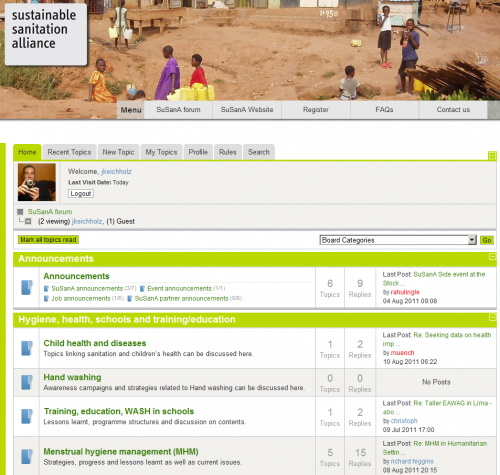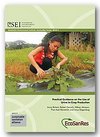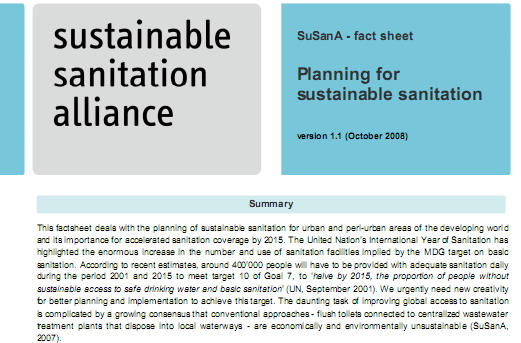The following is a guest post by GIZ ecosan team leader, Dr. Elisabeth von Münch:
Harnessing the wisdom of crowds: Open discussion forum helps to answer many sanitation related questions
The idea for this open discussion forum on sanitation came from our experience that when you want to buy a new car or have a question about your baby’s teeth: where do you get advice from? You put your question into a search engine like Google and you end up reading other people’s postings on a discussion forum. Usually, those questions and answers prove to be very helpful.

The same mechanism can hold true for a discussion forum on sanitation issues. This is why the Sustainable Sanitation Alliance (SuSanA) secretariat developed a new discussion forum which was launched in July 2011. The forum is open – as opposed to some existing closed fora which require a login even just for reading. Today, the SuSanA forum already has 930 registered users, 40 topics, nearly 1000 views for the most popular topics, and some topics have attracted up to 20 replies.
All postings are readable by everyone and searchable by search engines like Google and Yahoo. A broad range of topics are covered such as sanitation systems and technologies, health and hygiene, CLTS, school sanitation, sanitation systems for special conditions, menstrual hygiene management, SuSanA working groups and announcements and many more.
All registered users can contribute to the forum by creating new discussion topics or by responding to the posts of others. The option to create a user profile, including a passport-style photo, is available. The user can also attach additional documents and photos to his or her posts.
For people who like to receive postings via e-mail, it is also possible to subscribe to a daily e-mail alert service of new posts simply by leaving your e-mail address here. Alternatively or in addition, one can subscribe to specific categories or topics after logging in and thereby follow specific discussions.
Here are four examples of very active discussion threads so far:
• Faecal sludge management
• Mobile sanitation systems like peepoo bags in Kenya or a new urine diversion toilet pot in Bangladesh
• Menstrual Hygiene Management, including the Ruby Cup business idea in Kenya
• Progress of SuSanA working groups
To view the discussion forum or to obtain your own login for writing on the forum, please click here: www.forum.susana.org
For further information or questions please contact the SuSanA secretariat.

 The
The  In a collaborative process within the Sustainable Sanitation Alliance
In a collaborative process within the Sustainable Sanitation Alliance 